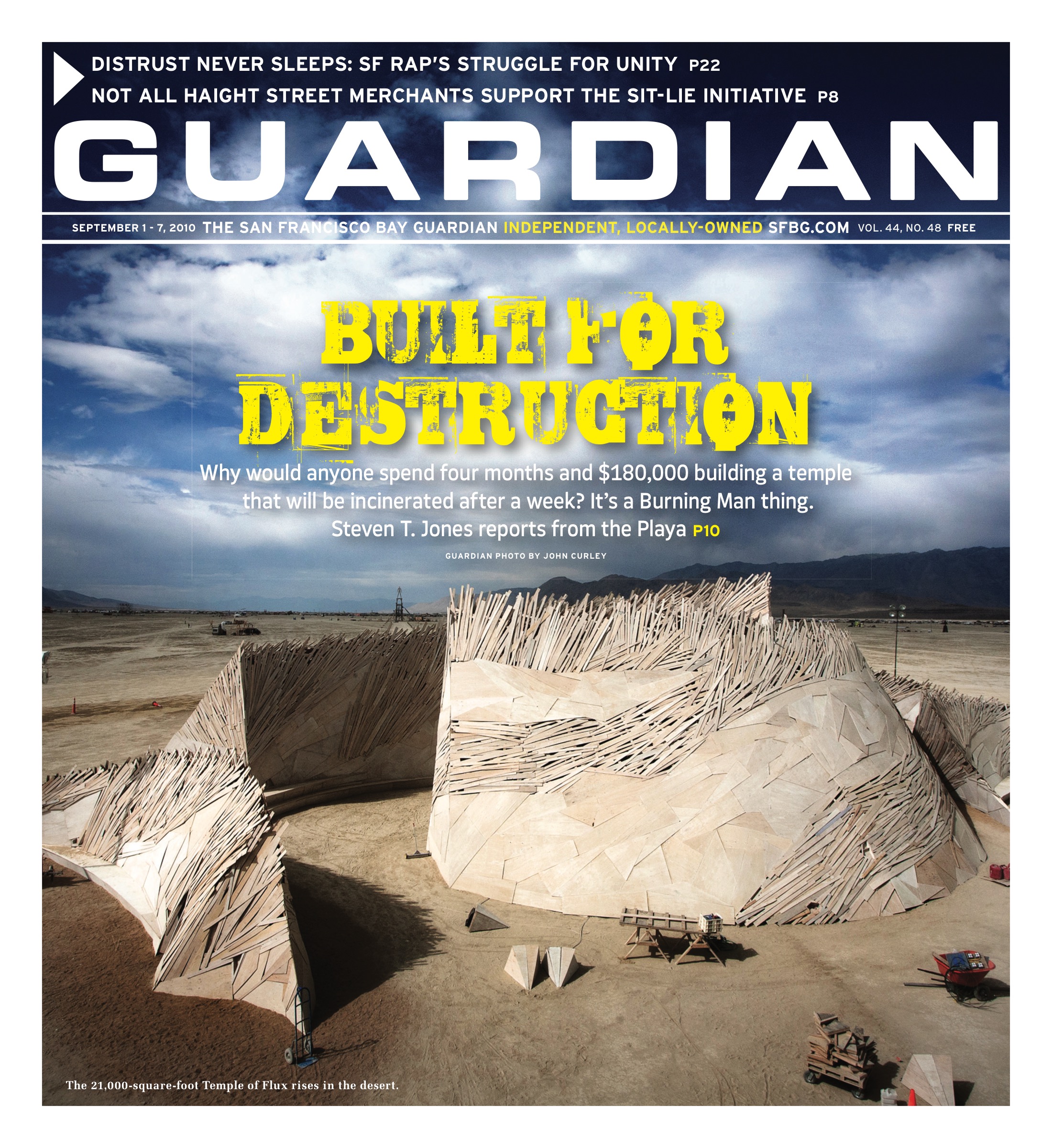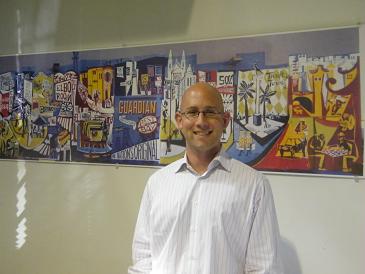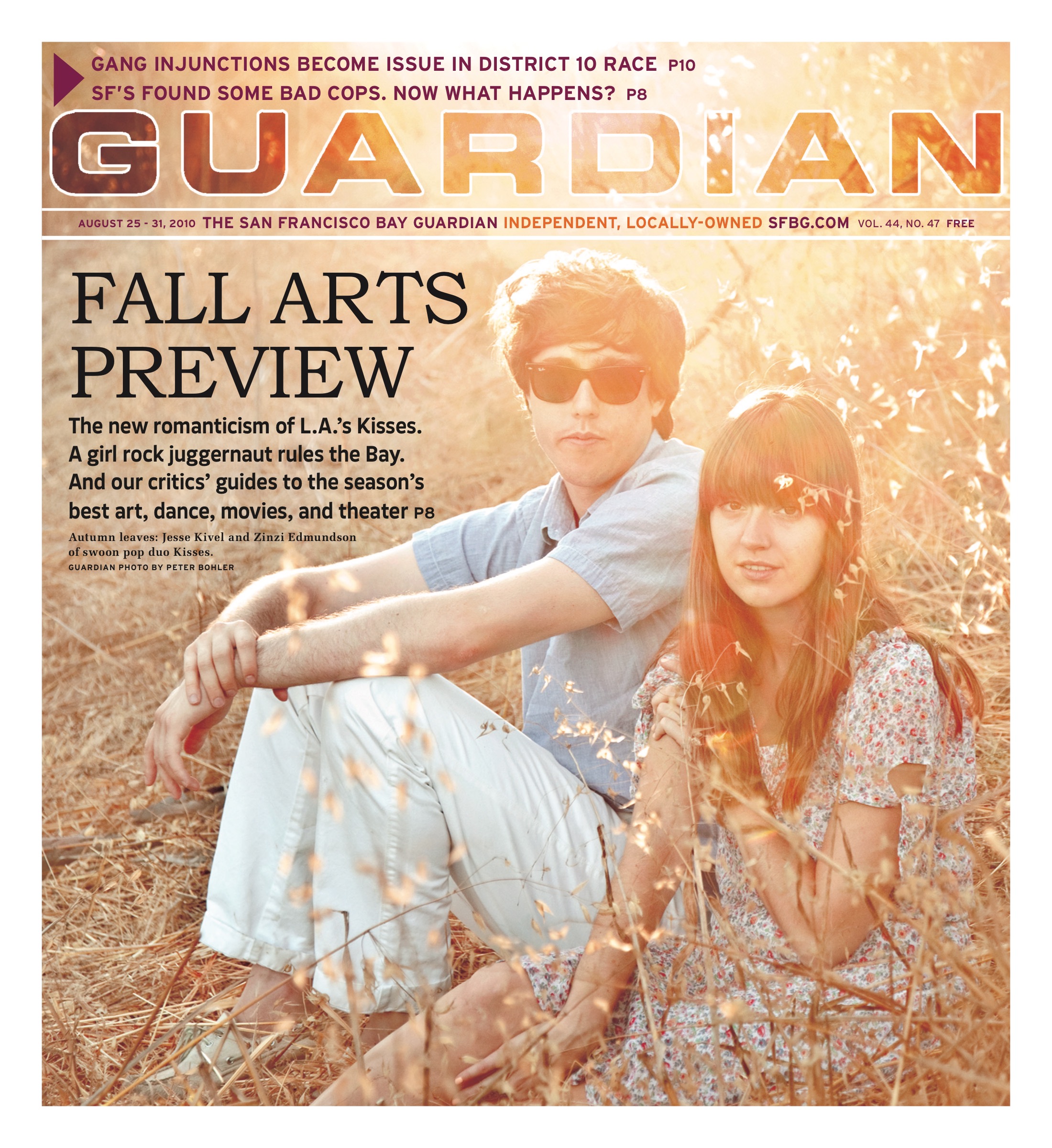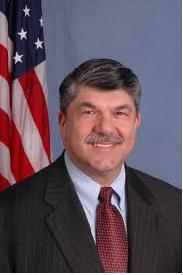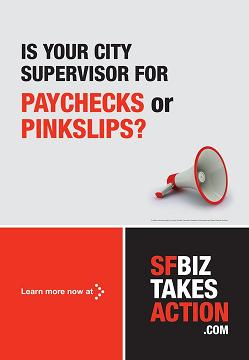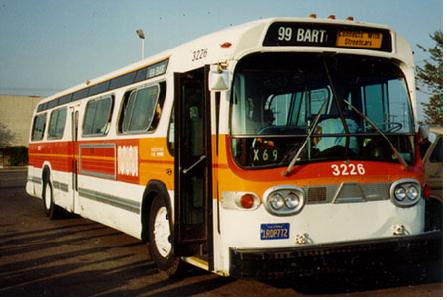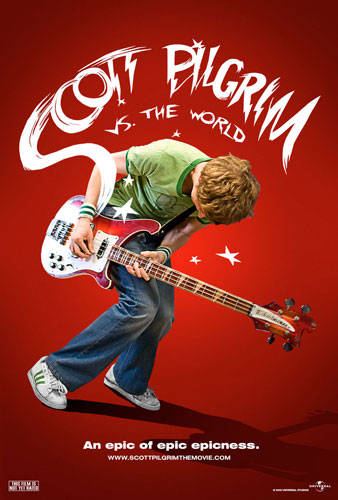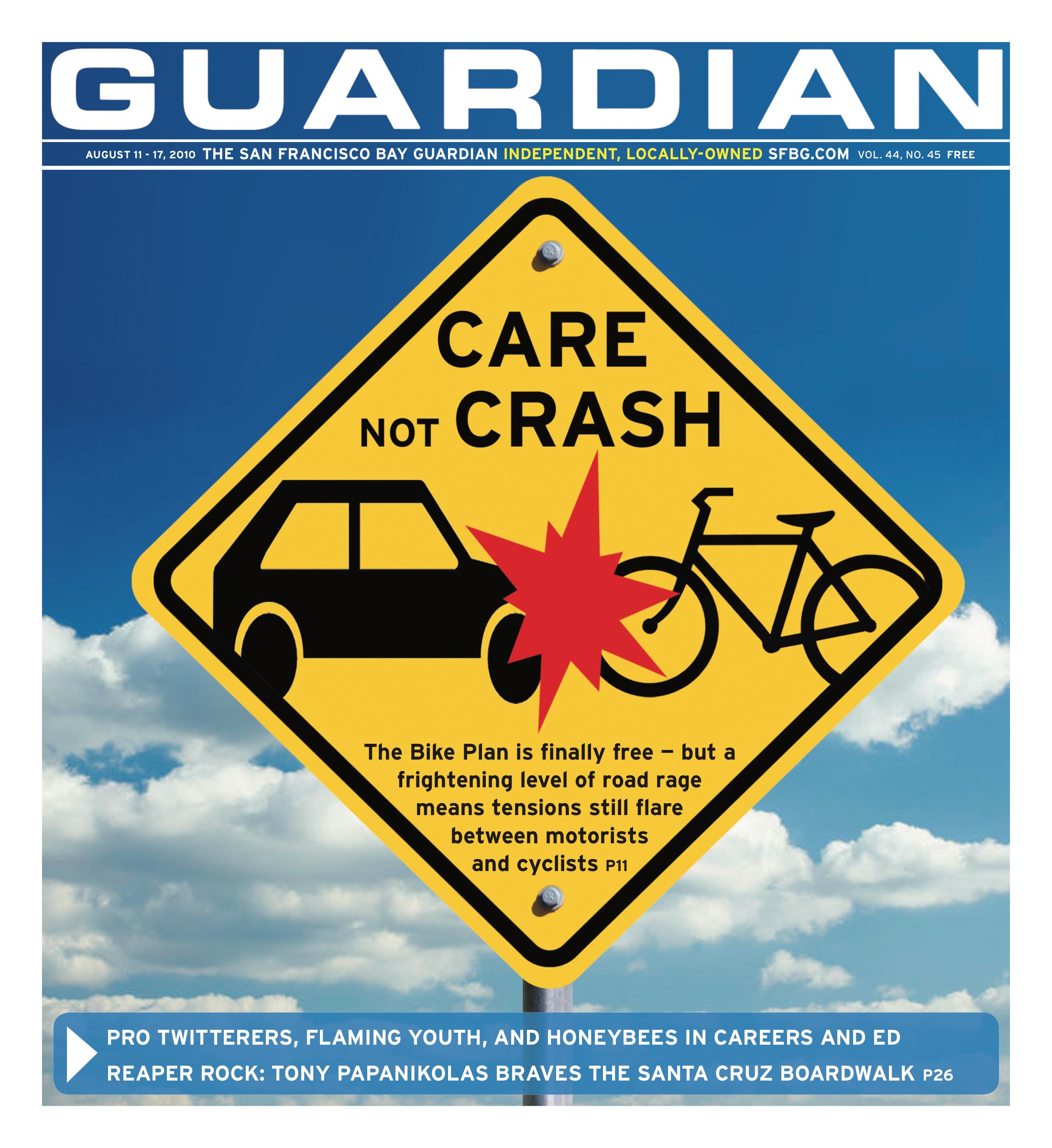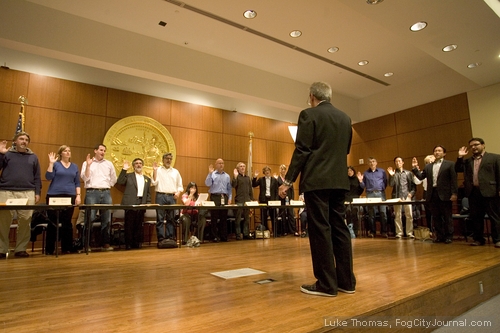Music listings are compiled by Paula Connelly and Cheryl Eddy. Since club life is unpredictable, it’s a good idea to call ahead to confirm bookings and hours. Prices are listed when provided to us. Submit items at listings@sfbg.com. For further information on how to submit items for the listings, see Picks.
WEDNESDAY 18
ROCK/BLUES/HIP-HOP
Black Francis, Roy Zimmerman Great American Music Hall. 9pm, $21.
Bodeans, Dan Navarro Independent. 8pm, $20.
Brothers Comatose, Escalator Hill, We Is Shore Determined Hotel Utah. 9pm, $6.
Casiokids, Light Pollution, K. Flay, Einar Stokka Café Du Nord. 9pm, $10.
Greg Davis, Aures, Mololy-Nagy Hemlock Tavern. 9pm, $7.
Ha Ha Tonka, Red Light Mind, Buxter Hoot’n Elbo Room. 9pm, $8.
Craig Horton Biscuits and Blues. 8 and 10pm, $15.
Brian McKnight Yoshi’s San Francisco. 8 and 10pm, $35-45.
Rantouls, Lateenos, Larry and the Angriest Generation, Jinxes Thee Parkside. 8pm, $8.
Wavves Amoeba, 1855 Haight, SF; www.amoeba.com. 6pm, free.
Wavves Rickshaw Stop. 7:30pm, $14.
Woven Bones, Sandwitches, Splinters Bottom of the Hill. 9pm, $10.
DANCE CLUBS
Booty Call Q-Bar, 456 Castro, SF; www.bootycallwednesdays.com. 9pm. Juanita Moore hosts this dance party, featuring DJ Robot Hustle.
Breezin Koko Cocktails, 1060 Geary, SF; (415) 885-4788. 9:30pm, free. With DJs Amy A and Brynnie Mac spinning rock and 70s.
45 Club Knockout. 9pm, $6. Rock n’ soul with Honey, Blasted Canyons, and DJs dX the Funky Granpaw, Dirty Dishes, and English Steve.
Hands Down! Bar on Church. 9pm, free. With DJs Claksaarb, Mykill, and guests spinning indie, electro, house, and bangers.
Jam Fresh Wednesdays Vessel, 85 Campton, SF; (415) 433-8585. 9:30pm, free. With DJs Slick D, Chris Clouse, Rich Era, Don Lynch, and more spinning top40, mashups, hip hop, and remixes.
Mary-Go-Round Lookout, 3600 16th St, SF; (415) 431-0306. 10pm, $5. A weekly drag show with hosts Cookie Dough, Pollo Del Mar, and Suppositori Spelling.
RedWine Social Dalva. 9pm-2am, free. DJ TophOne and guests spin outernational funk and get drunk.
Respect Wednesdays End Up. 10pm, $5. Rotating DJs Daddy Rolo, Young Fyah, Irie Dole, I-Vier, Sake One, Serg, and more spinning reggae, dancehall, roots, lovers rock, and mash ups.
Synchronize Il Pirata, 2007 16th St, SF; (415) 626-2626. 10pm, free. Psychedelic dance music with DJs Helios, Gatto Matto, Psy Lotus, Intergalactoid, and guests.
THURSDAY 19
ROCK/BLUES/HIP-HOP
Abriel, Imperfect Deity, To Memory and Me DNA Lounge. 5:30pm, $12. With the Light Iris, Our Living Memory, Falling to Pieces, Mirros, Apothesary, and A Moment of Clarity.
Catholic Radio, Smile Brigade, Spiral Agnew Kimo’s. 9pm.
Clipd Beaks, Moccretro, Hollow Hearth, Hans Keller Café Du Nord. 9pm, $10.
Darker My Love, Sonny and the Sunsets Independent. 8pm, $14.
Brandon Flowers Slim’s. 9pm, $27.50.
Grand Lodge, Lijie Hotel Utah. 8pm, $7.
Hot Hot Heat, 22-20s, Hey Rosetta! Rickshaw Stop. 8pm, $15.
Hunx and His Punx, Shannon and the Clams, Okmoniks, Goochi Boiz, Miss Chain and the Broken Heels Thee Parkside. 9pm, $10.
Ida, Michael Hurley, Westwood and Willow Bottom of the Hill. 9pm, $12.
Lickets, Odd Owl, Tied to the Branches Hemlock Tavern. 9pm, $7.
Brian McKnight Yoshi’s San Francisco. 8 and 10pm, $35-45.
Darrell Scott, Elliot Randall Great American Music Hall. 8pm, $21.
Wild Things, Lens, Greg Ashley Knockout. 9:30pm, $7.
FOLK/WORLD/COUNTRY
Estamos Ensemble New Frequencies, YBCA Sculpture Court, 701 Mission, SF; (415) 978-2787. 8pm, $25
Hot Club of Cowtown, Whiskey Richards, B Stars Amnesia. 8:30pm, $10.
Claudio Santomé and Marcello Puig Red Poppy Art House. 8pm, $12-15.
Steel Pulse Fillmore. 9pm, $35.
Tipsy House Plough and Stars. 9pm.
DANCE CLUBS
Afrolicious Elbo Room. 9:30pm, $5-7. DJs Pleasuremaker and Señor Oz spin Afro-tropical, samba, and funk.
Caribbean Connection Little Baobab, 3388 19th St, SF; (415) 643-3558. 10pm, $3. DJ Stevie B and guests spin reggae, soca, zouk, reggaetón, and more.
Club Jammies Edinburgh Castle. 10pm, free. DJs EBERrad and White Mice spinning reggae, punk, dub, and post punk.
Drop the Pressure Underground SF. 6-10pm, free. Electro, house, and datafunk highlight this weekly happy hour.
Electric Feel Lookout, 3600 16th St, SF; (415) 431-0306. 9pm, $2. With DJs subOctave and Blondie K spinning indie music videos.
Good Foot Som., 2925 16th St, SF; (415) 558-8521. 10pm, free. With DJs spinning R&B, Hip hop, classics, and soul.
Jivin’ Dirty Disco Butter, 354 11th St., SF; (415) 863-5964. 8pm, free. With DJs spinning disco, funk, and classics.
Koko Puffs Koko Cocktails, 1060 Geary, SF; (415) 885-4788. 10pm, free. Dubby roots reggae and Jamaican funk from rotating DJs.
Mestiza Bollywood Café, 3376 19th St, SF; (415) 970-0362. 10pm, free. Showcasing progressive Latin and global beats with DJ Juan Data.
Nightvision Harlot, 46 Minna, SF; (415) 777-1077. 9:30pm, $10. DJs Danny Daze, Franky Boissy, and more spinning house, electro, hip hop, funk, and more.
Peaches Skylark, 10pm, free. With an all female DJ line up featuring Deeandroid, Lady Fingaz, That Girl, and Umami spinning hip hop.
Popscene 330 Rich. 10pm, $10. Rotating DJs spinning indie, Britpop, electro, new wave, and post-punk.
SOL Club 525, 525 Harrison, SF; www.sol2010.eventbrite.com. 9pm, $15. With DJs Andy P., Skander and Sohrab, Rhetoric, Sepehr, and more spinning house, tech, and tribal.
Solid Thursdays Club Six. 9pm, free. With DJs Daddy Rolo and Tesfa spinning roots, reggae, dancehall, soca, and mashups.
Tropicana Madrone Art Bar. 9pm, $5. With DJs Don Bustamante, Apocolypto, Sr. Saenz and guests spinning salsa, cumbia, reggaeton, and merengue.
FRIDAY 20
ROCK/BLUES/HIP-HOP
Blisses B, Be Brave Bold Robot, Grownup Noise Kimo’s. 9pm.
Crooked Still, Jesse DeNatale Great American Music Hall. 8pm, $16.
Excuses for Skipping, Cliks, Killola, Hunter Valentine Milk. 8:30pm, $10.
Gentleman Jesse and His Men, Personal and the Pizzas, Barreracudas, Wrong Words, Meercaz Thee Parkside. 9pm, $10.
Ghostland Observatory Warfield. 9pm, $25.
Jogger, We Are the World, Shlohmo, Matthewdavid Rickshaw Stop. 8:30pm, $12.
Morlocks, Hot Lunch Hemlock Tavern. 9:30pm, $10.
New Orleans Bingo! Show, Kim Boekbinder Independent. 9pm, $15.
Persephone’s Bees, Soft White Sixties, Angel Island, DJ Omar Café Du Nord. 9:30pm, $12.
Pinkerton, Hot Toddies, As A People Bottom of the Hill. 10pm, $10.
Polkacide, Khi Darag, Loop Station, Space Blaster Blue Macaw, 2565 Mission, SF; (415) 920-0577. 9pm, $10.
Johnny Rawls Biscuits and Blues. 8 and 10pm, $20.
Still Time, Shamblers, John Howland Slim’s. 9pm, $15.
Ttotals, Diego Gonzalez Hemlock Tavern. 6pm, $5.
JAZZ/NEW MUSIC
Audium 9 1616 Bush, SF; (415) 771-1616. 8:30pm, $15.
Black Market Jazz Orchestra Top of the Mark. 9pm, $10.
David Belove Trio Art Tap, Yerba Buena Center for the Arts, 701 Mission, SF; (415) 978-2787, www.ybca.org. 6pm, free.
Eleven Eyes Coda. 10pm, $10.
Jacqui Naylor Quartet Rrazz Room, Hotel Nikko, 222 Mason, SF; www.therrazzroom.com. 9pm, $35.
Lisa Engelken Band Red Poppy Art House. 9pm, $12-20.
Marlena Teich and group Savanna Jazz. 7:30pm, $8.
FOLK/WORLD/COUNTRY
Charanga Habanera Yoshi’s San Francisco. 8 and 10pm, $20-26.
“Cuba Afro Rock Revolution” Yerba Buena Center for the Arts, 701 Mission, SF; (415) 978-2787. 8pm, $28-$50. With X Alfonso, Osamu, and special guest Pedro Calvo.
Toshio Hirano Mercury Café, 201 Octavia, SF; (415) 252-7855. 7:30pm, free.
Hot Club of Cowtown, Lady A and the Heel Draggers, Betty Soo Amnesia. 9pm, $10.
Lagos Roots Afrobeat Ensemble Elbo Room. 9:30pm, $12. With DJ Shawna, Tribal Fusion Bellydance, and Deb Rubin.
Summer Samba Party Il Pirata, 2007 16th St., SF; (415) 626-2626. 10pm, $10. With Pagode de Mesa, Jorge Alabe, Claudinho Sorriso, Brian Moran, and guests.
Bucky Walters, Snap Jackson, The Knock on Wood Players Plough and Stars. 9pm.
DANCE CLUBS
Afrobeat No Go Die Madrone Art Bar. 9:30pm, $5. With DJs Jeremiah and the Afrobeat Nation and Jose Rivera.
Club Dragon Club Eight, 1151 Folsom, SF; www.eightsf.com. 9pm, $8. A gay Asian paradise. Featuring two dance floors playing dance and hip hop, smoking patio, and 2 for 1 drinks before 10pm.
Dirty Bird Mezzanine, 444 Jessie, SF; (415) 625-8880. 9pm, $20. With DJs Claude Von Stroke, Juston Martin, Christian Martin, and Worthy.
Dirty Rotten Dance Party Madrone Art Bar. 9pm, $5. With DJs Morale, Kap10 Harris, and Shane King spinning electro, bootybass, crunk, swampy breaks, hyphy, rap, and party classics.
Episco Disco Grace Cathedral, 1100 California, SF; (415) 869-7817. 7pm, free. With live music by Coconut, Paradise Now, and Aero-Mic’d and art by Land and Sea and Sean McFarland.
Exhale, Fridays Project One Gallery, 251 Rhode Island, SF; (415) 465-2129. 5pm, $5. Happy hour with art, fine food, and music with Vin Sol, King Most, DJ Centipede, and Shane King.
Fat Stack Fridays Koko Cocktails, 1060 Geary, SF; (415) 885-4788. 10pm, free. With rotating DJs B-Cause, Vinnie Esparza, Mr. Robinson, Toph One, and Slopoke.
Fubar Fridays Butter, 354 11th St., SF; (415) 863-5964. 6pm, $5. With DJs spinning retro mashup remixes.
Good Life Fridays Apartment 24, 440 Broadway, SF; (415) 989-3434. 10pm, $10. With DJ Brian spinning hip hop, mashups, and top 40.
Hot Chocolate Milk. 9pm, $5. With DJs Big Fat Frog, Chardmo, DuseRock, and more spinning old and new school funk.
Oldies Night Knockout. 9pm, $2-4. One-hit wonders and scratchy soul with DJs Primo, Daniel, and Lost Cat.
Radioactivity 222 Hyde, SF; (415) 440-0222. 6pm. Synth sounds of the cold war era.
Rockabilly Fridays Jay N Bee Club, 2736 20th St, SF; (415) 824-4190. 9pm, free. With DJs Rockin’ Raul, Oakie Oran, Sergio Iglesias, and Tanoa “Samoa Boy” spinning 50s and 60s Doo Wop, Rockabilly, Bop, Jive, and more.
“SF Drag King Contest” DNA Lounge. 9pm, $25-35. With MCs Fudgie Frottage and Sister Roma, plus special guest Jane Wiedlin.
Sisters of the Underground Club Six. 9pm, $5. With DJs Shortee, Lady Fingaz, Pony P, Celskii and Deeandroid, and many more spinning hip hop.
Some Thing The Stud. 10pm, $7. VivvyAnne Forevermore, Glamamore, and DJ Down-E give you fierce drag shows and afterhours dancing.
SATURDAY 21
ROCK/BLUES/HIP-HOP
Chris Cain Band Biscuits and Blues. 8 and 10pm, $20.
Cool Water Canyon, Vintage Music Collective Independent. 9pm, $15.
Hepcat, Inciters, Selecter DJ Kirk Slim’s. 9pm, $23.
“Joe Strummer Tribute” Bottom of the Hill. 9pm, $10. With Armagideons, Hooks, Monkey, Sistas in the Pit, Stigma 13, and Interecords.
Man/Miracle, Slang Chickens, Yellow Dress Hemlock Tavern. 9:30pm, $7.
No Alternative, VKTMS Bender’s, 806 S. Van Ness, SF; www.bendersbar.com. 10pm, $5. Benefit for the Haight Ashbury Homeless Youth Alliance.
Nobunny, Mean Jeans, Anomalys, Charlie and the Moonhearts Thee Parkside. 9pm, $10.
Return to Mono, Foreign Cinema, Sentinel, Bring the Tiger Red Devil Lounge. 8pm, $10.
Sons of Doug, Steve Pile Band, Jeremy D. Antonio Hotel Utah. 9pm, $7.
Sputterdoll, Pedro Gil, Skyflakes, Rocking Kids Sing-A-Long, Keenwild Thee Parkside. 3pm, free.
Tussle, Sword and Sandals, ASSS Amnesia. 9pm, $5.
JAZZ/NEW MUSIC
Audium 9 1616 Bush, SF; (415) 771-1616. 8:30pm, $15.
Ensemble Mik Nawooj Red Poppy Art House. 9pm, $15-20.
Eric Kurtzrock Trio Ana Mandara, Ghirardelli Square, 891 Beach, SF; (415) 771-6800. 8pm, free.
Giovenco Project Coda. 7pm, free.
Jacqui Naylor Quartet Rrazz Room, Hotel Nikko, 222 Mason, SF; www.therrazzroom.com. 9pm, $35.
Lucky Stars, B Stars Verdi Club, 2424 Mariposa, SF; www.oldtimey.net. 9:30pm, $12.
Suzanna Smith and group Savanna Jazz. 7:30pm, $8.
FOLK/WORLD/COUNTRY
Charanga Habanera Yoshi’s San Francisco. 8 and 10pm, $20-26.
“Cuba Afro Rock Revolution” Yerba Buena Center for the Arts, 701 Mission, SF; (415) 978-2787. 8pm, $28-$50. With X Alfonso, Osamu, and special guest Pedro Calvo.
Maurice Tani, Jenn Courtney, 77 El Deora, Misispi Rider Noe Valley Ministry, 1021 Sanchez, SF; (415) 454-5238. 8:15pm, $17.
Tito Garcia y su Orquesta Internacional The Ramp, 855 Terry Francois, SF; (415) 621-2378. 5pm.
Tornotics Plough and Stars. 9pm, $6-$10 sliding scale.
Craig Ventresco and Meredith Axelrod Atlas Café. 4pm, free.
DANCE CLUBS
Bar on Church 9pm. Rotating DJs Foxxee, Joseph Lee, Zhaldee, Mark Andrus, and Nuxx.
Bootie DNA Lounge. 9pm, $6-12. Mash-ups with DJ Ajax vs. Ryan Lendt, plus residents Adrian and Mysterious D.
Booty Bassment Knockout. 10pm, $5. Hip-hop with DJs Ryan Poulsen and Dimitri Dickenson.
Club 1994 Paradise Lounge. 10pm, $10. Presented by Jeffery Paradise and Ava Berlin, featuring 90’s music, themed photo booth, fashion show, and more.
Cock Fight Underground SF. 9pm, $7. Gay locker room antics galore with electro-spinning DJ Earworm.
Fire Corner Koko Cocktails, 1060 Geary, SF; (415) 885-4788. 9:30pm, free. Rare and outrageous ska, rocksteady, and reggae vinyl with Revival Sound System and guests.
Fringe Madrone Art Bar. 9pm, $5. With DJs Blondie K and subOctave spinning indie music videos.
Full House Gravity, 3505 Scott, SF; (415) 776-1928. 9pm, $10. With DJs Roost Uno and Pony P spinning dirty hip hop.
HYP Club Eight, 1151 Folsom, SF; www.eightsf.com. 10pm, free. Gay and lesbian hip hop party, featuring DJs spinning the newest in the top 40s hip hop and hyphy.
Non Stop Bhangra Rickshaw Stop. 9pm, $15. Bhangra beats with Dholrhythms Dance Troupe.
Paint Factory Club Six. 9pm, $5. With DJs Romanowski, Centipede, and Mr. Robinson spinning house, downtempo, and hip hop and live painting by Nome Edonna and Ian Ross.
Prince vs. Michael Madrone Art Bar. 8pm, $5. With DJs Dave Paul and Jeff Harris battling it out on the turntables with album cuts, remixes, rare tracks, and classics.
Rock City Butter, 354 11th St., SF; (415) 863-5964. 6pm, $5 after 10pm. With DJs spinning party rock.
Saturday Night Soul Party Elbo Room. 10pm-2am, $5. DJs Lucky, Paul Paul, and Phengren Oswald spin butt-shakin’ ’60s soul.
Spirit Fingers Sessions 330 Ritch. 9pm, free. With DJ Morse Code and live guest performances.
Wet and Wild Club 8, 1151 Folsom, SF; (415) 431-1151. 10pm, $8. With DJs Techminds and Kipp Glass.
SUNDAY 22
ROCK/BLUES/HIP-HOP
“Battle of the Bands” DNA Lounge. 5:30pm, $12. With Boondock Squad, Thanks for Leaving, Out for Blood, and more.
“Bay Vibes Summer Musicfest 3” Café Cocomo. Noon-2am, $35. Two stages of music with Isabella, Native Elements, Dogman Joe, My Peoples, Afrolicious, and more.
Butlers, Only Sons, Burnt House Bottom of the Hill. 5:30pm, $8.
Mike Coykendall and the Golden Shag, Brian Belknap, Tom Heyman Make-Out Room. 8pm, $8.
Horde and the Harem, Aimless Never Miss, Buttercream Gang, And I Was Like, What? Rickshaw Stop. 7pm, $10.
Sarah Jaffe, Glassines, Kristy Kruger Hemlock Tavern. 8pm, $8.
Lazy Loper, Con Brio, Shake Well Amnesia. 9:30pm, $8-10.
Moonlight Orchestra, Stormy California Thee Parkside. 8pm, $7.
“Rock Make Street Festival” Treat and 18th St, SF; www.rockmake.com. 11am-6pm, free. With Tartufi, AB and the Sea, Still Flyin’, Leopold and His Fiction, and more.
Summer Twins, Twinks, Danger Babes, Omni, DJ Neil Martinson Knockout. 9pm.
They Might Be Giants, Rogue Wave Sigmund Stern Grove, 19th Ave at Sloat, SF; www.sterngrove.org. 2pm, free.
JAZZ/NEW MUSIC
Ernie Small Memorial Big Band Savanna Jazz. 7:30pm, $5.
Sunday Sessions Madrone Art Bar. 6pm, free. With organist Will Blades leading a jazz jam session.
FOLK/WORLD/COUNTY
Annete A. Aguilar and Stringbeans Coda. 8pm, $10.
Back 40, Carburetors Thee Parkside. 4pm, free.
Charanga Habanera Yoshi’s San Francisco. 6 and 8pm, $20.
Charity and the JAMband, Elizabeth Mitchell Park Chalet, 1000 Great Highway, SF; (415) 386-8439. 3pm, free. An outdoor family concert.
Crow Quail Night Owls Amnesia. 6-9pm, $8-10.
Gente do Samba The Ramp, 855 Terry Francois, SF; (415) 621-2378. 5pm.
Queen Makedah Café Cocomo. 5pm, $25-$60.
John Sherry, Kyle Thayer and friends Plough and Stars. 9pm.
DANCE CLUBS
DiscoFunk Mashups Cat Club. 10pm, free. House and 70’s music.
Dub Mission Elbo Room. 9pm, $6. Dub, roots, and classic dancehall with DJs Sep, Ludachris, and guest Bella.
Gloss Sundays Trigger, 2344 Market, SF; (415) 551-CLUB. 7pm. With DJ Hawthorne spinning house, funk, soul, retro, and disco.
Honey Soundsystem Paradise Lounge. 8pm-2am. “Dance floor for dancers – sound system for lovers.” Got that?
Jock! Lookout, 3600 16th St, SF; (415) 431-0306. 3pm, $2. This high-energy party raises money for LGBT sports teams.
Kick It Bar on Church. 9pm. Hip-hop with DJ Zax.
Lowbrow Sunday Delirium. 1pm, free. DJ Roost Uno and guests spinning club hip hop, indie, and top 40s.
Religion Bar on Church. 3pm. With DJ Nikita.
Stag AsiaSF. 6pm, $5. Gay bachelor parties are the target demo of this weekly erotic tea dance.
Swing Out Sundays Rock-It Room. 7pm, free (dance lessons $15). DJ BeBop Burnie spins 20s through 50s swing, jive, and more.
MONDAY 23
ROCK/BLUES/HIP-HOP
Crowded House, Lawrence Arabia Warfield. 8pm, $45-62.50.
Decapitated, Faceless, All Shall Parish, Red Chord, Veil of Maya, Cephanic Carnage Fillmore. 3:30pm, $25. With Decrepit Death, Carnifex, Animals as Leaders, and Vital Remains.
Girl in a Coma, Gringo Star, Agent Ribbons Bottom of the Hill. 9pm, $12.
DANCE CLUBS
Black Gold Koko Cocktails, 1060 Geary, SF; (415) 885-4788. 10pm-2am, free. Senator Soul spins Detroit soul, Motown, New Orleans R&B, and more — all on 45!
Death Guild DNA Lounge. 9:30pm, $3-5. Gothic, industrial, and synthpop with Decay, Joe Radio, and Melting Girl.
Karaoke Killed the Cat Elbo Room. 9pm, $5. Karaoke.
Krazy Mondays Beauty Bar. 10pm, free. With DJs Ant-1, $ir-Tipp, Ruby Red I, Lo, and Gelo spinning hip hop.
M.O.M. Madrone Art Bar. 6pm, free. With DJ Gordo Cabeza and guests playing all Motown every Monday.
Manic Mondays Bar on Church. 9pm. Drink 80-cent cosmos with Djs Mark Andrus and Dangerous Dan.
Musik for Your Teeth Revolution Café, 3248 22nd St., SF; (415) 642-0474. 5pm, free. Soul cookin’ happy hour tunes with DJ Antonino Musco.
Network Mondays Azul Lounge, One Tillman Pl, SF; www.inhousetalent.com. 9pm, $5. Hip-hop, R&B, and spoken word open mic, plus featured performers.
Skylarking Skylark. 10pm, free. With resident DJs I & I Vibration, Beatnok, and Mr. Lucky and weekly guest DJs.
TUESDAY 24
ROCK/BLUES/HIP-HOP
Alvon Biscuits and Blues. 8 and 10pm, $15.
Audacity, Todd C and the Clown Sound, Mill Valley’s Most Honest Men Hemlock Tavern. 6pm, $5.
Bad Brains, Broun Fellinis Slim’s. 9pm, $26.
La Corde, Cat Party, Dadfag, DJs Deadbeat and Yule Be Sorry Knockout. 9:30pm, $5.
Eastern Conference Champs, Voxhaul Broadcast Hemlock Tavern. 9pm, $6. Grand Lake, It’s for Free Grace, Sean Smith and the Present Moment, James and Evander Café Du Nord. 9pm, $10. Psalm One, Open Mike Eagle, League510 Elbo Room. 9pm, $8. Scene of Action, Paper Sons, Pebble Theory Bottom of the Hill. 9pm, $8. Shaimus, Star Anna and the Laughing Dogs Hotel Utah. 8pm, $8. Something Corporate Warfield. 8:30pm, $30. DANCE CLUBS Alcoholocaust Presents Argus Lounge. 9pm, free. With DJ D-runk and D. Jake. Eclectic Company Skylark, 9pm, free. DJs Tones and Jaybee spin old school hip hop, bass, dub, glitch, and electro. Share the Love Trigger, 2344 Market, SF; (415) 551-CLUB. 5pm, free. With DJ Pam Hubbuck spinning house. Womanizer Bar on Church. 9pm. With DJ Nuxx

